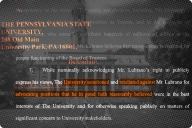You have /5 articles left.
Sign up for a free account or log in.
Last week, as a favor to a friend, I met with someone who’s trying to break into the community college sector for an informational interview. We had a good, professional conversation, in which she was clear about trying to navigate unfamiliar terrain and I offered whatever sense making I could. At one point, though, she made a comment that landed slightly sideways with me. “After I applied for the position, they canceled the search. I’m sure something political was going on.”
Not necessarily, or at least, not in any sinister sense.
Last week, we actually canceled a search on my own campus. The reason there was as straightforward as it gets: funding. The budget is tighter than we had expected when we advertised it, so we had to go back to the drawing board. I’m working on an alternative to get us most of what we needed, at lower cost. That’s a common reason.
Over the years at several different colleges, I’ve seen posted positions disappear for several different reasons. Other than funding, they’ve included:
- A more urgent need opening up. This could be the abrupt and unexpected departure of someone in a key role, sometimes leading to a cascade of moves throughout a part of the organization. When you’re cutting by attrition, every replacement hire is looked at as a new hire, so the burden of proof for any hire goes up. If a board or CFO has decreed that you can only hire, say, three, then you allocate those three to the areas of greatest need. Those can change on a moment’s notice, and some level of that can’t be avoided. I’ve had full-time faculty bolt the week before classes started, whether for a new job or to follow a spouse/partner. I’ve also seen dedicated employees get severely ill without warning. It happens.
- Enrollment fluctuations. If enrollments fall short of projections, whether in one area or in the college as a whole, it’s far easier to cancel searches than to lay off incumbents. At scale, over time, that can become a form of intergenerational theft, but in the moment, the logic is hard to refute.
- Weak candidate pools. This is much more common in some job categories than others. It almost never happens in the ranks of humanities or social science faculty, for instance. But it can happen in certain fields with higher industry demand, and it happens with some frequency in administrative searches. I’m of the school that prefers to be pickier at the point of hire, rather than churn and burn, though there are arguments on both sides of that. The danger here, in a time of cutting by attrition, is that temporary workarounds can become permanent if you aren’t careful.
- Tainted process. At a previous college, years ago, I pulled the plug on a search when it came to light that the department chair was pushing inappropriately for a personal friend to get a position. It led to some strained moments, but it had to be done. Happily, word traveled fast, so that never happened again. I can deal with mistakes in the process, but there’s a world of difference between mistakes and cheating.
- External forces. Every so often, the state or the feds will change the ground rules. Last year, for instance, the state abruptly passed a 60-credit cap for associate degree programs. In some programs, that led to courses being cut. Depending on how it falls, a change like that could render the need for a position moot. That was the intent of the law (“cost control”), so it wouldn’t be shocking if some degree of intent were achieved.
I’ve never seen a position pulled just to get back at somebody. I’m not saying it never happens -- anything’s possible -- but I’ve never seen it. In a setting in which you’re cutting by attrition, who could afford that? It’s no way to manage, let alone to live.
In a macro sense, of course, it’s fair to refer to budgets as political. But in the sense in which she seemed to use the term -- petty jealousies, internal rivalries, that sort of thing -- no. Colleges are not immune to politics, but most of us are actually trying to do the right thing, within the constraints given. That’s of little comfort when a job you were hoping for vanishes, but it’s often true.
As for external politics, on the other hand …







